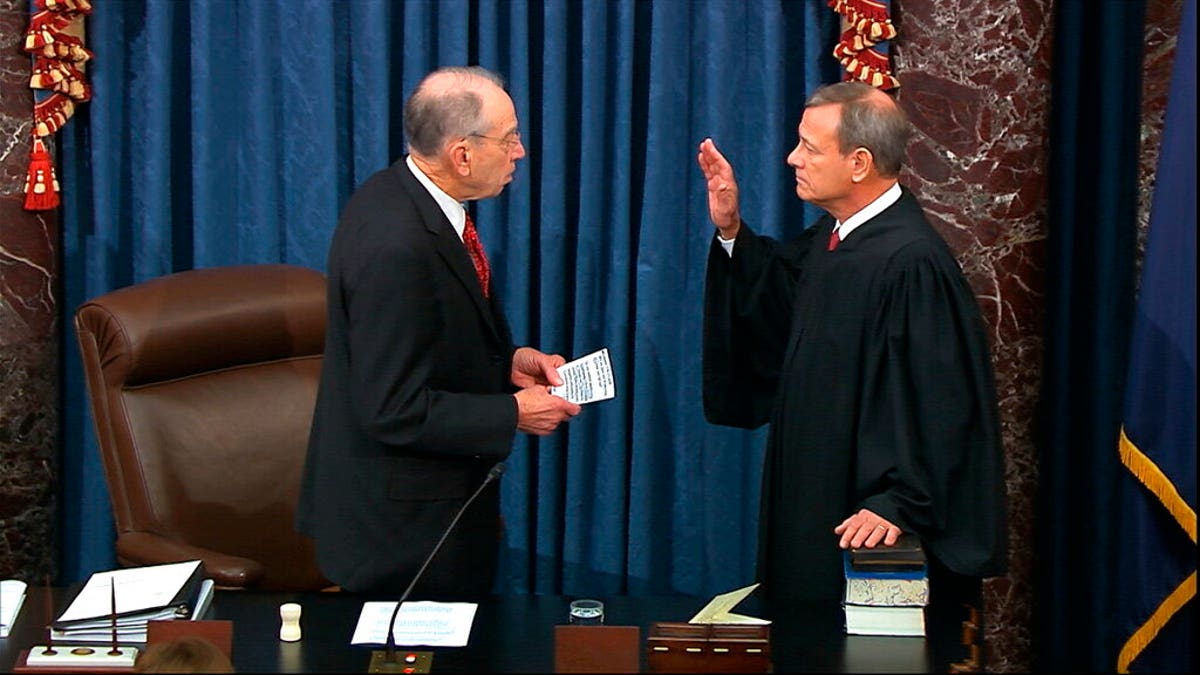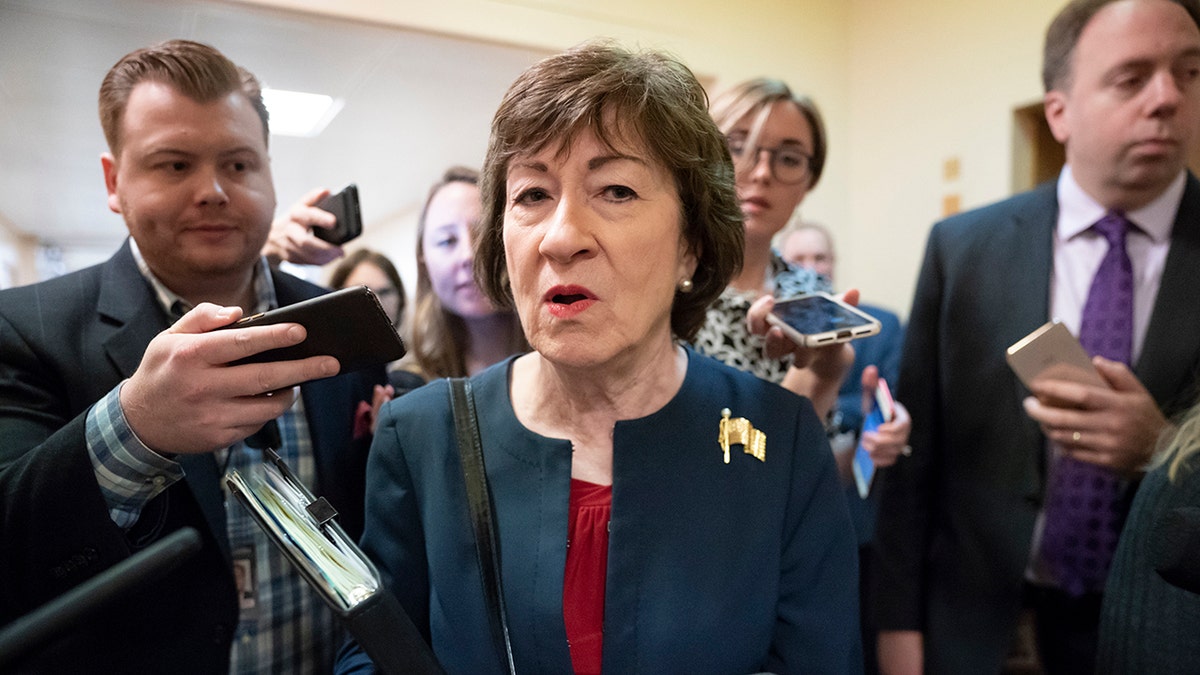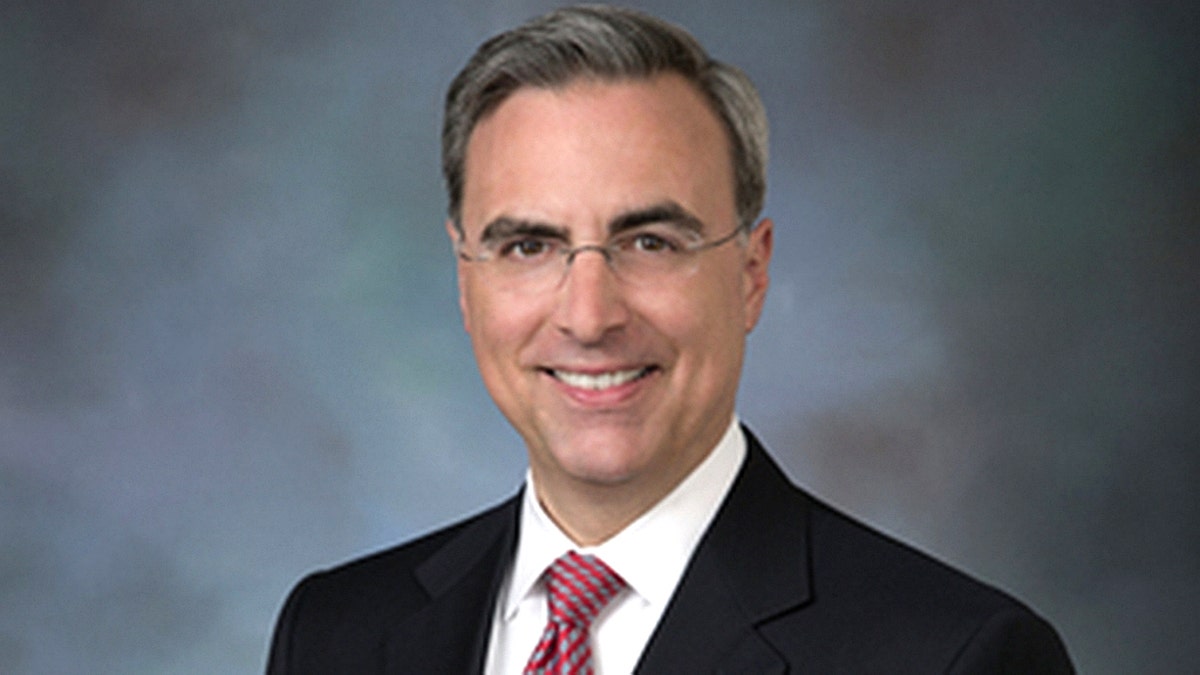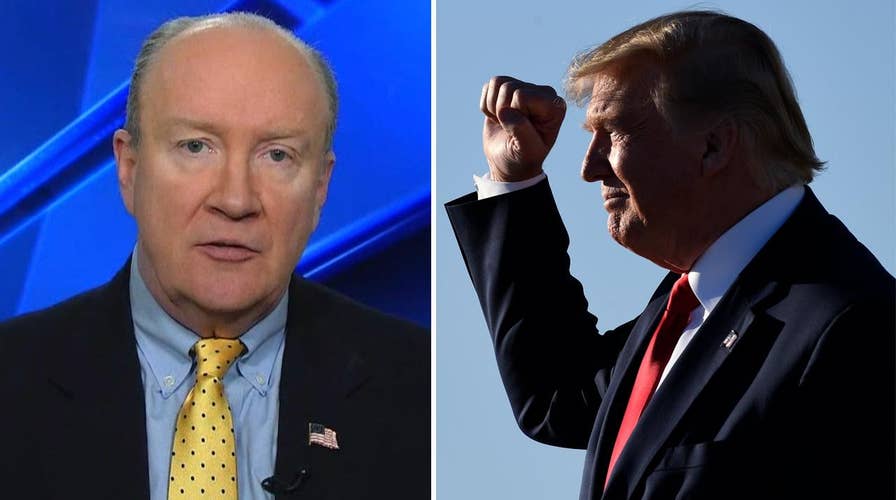Andy McCarthy: Everything you need to know about the Senate impeachment trial
Fox News contributor Andy McCarthy breaks down everything Americans need to know about the Senate's impeachment trial against President Donald Trump.
The U.S. chief justice, seven high-profile Democratic prosecutors, a heavy-hitting legal defense team and 100 senators will all play a critical role in reaching a verdict on the impeachment charges against President Trump, live on national television, in the coming weeks.
The third impeachment trial in the history of the United States is underway and the crux of it begins Tuesday afternoon when the Senate reconvenes after the long weekend. Below is a guide to understanding the procedures, rules, possible surprises and potential outcomes of the Trump impeachment trial.
How it works
After formally opening Thursday, the Senate's impeachment trial will begin in earnest Tuesday afternoon. During the impeachment trial, the Senate will be in session every day except Sunday.
Majority Leader Sen. Mitch McConnell, R-Ky., and Minority Leader Chuck Schumer, D-N.Y., released a decorum guide telling senators they are expected, "to be in attendance at all times during the proceedings," and that they are not allowed to have phones or other electronics during the trial. They are also not allowed to speak during the proceedings.

President Pro Tempore of the Senate Sen. Chuck Grassley, R-Iowa., swears in Supreme Court Chief Justice John Roberts as the presiding officer for the impeachment trial of President Donald Trump in the Senate at the U.S. Capitol in Washington, Thursday, Jan. 16, 2020. (Senate Television via AP)
CHIEF JUSTICE JOHN ROBERTS, SENATORS SWORN IN AS TRUMP IMPEACHMENT TRIAL OPENS
As things got underway Tuesday, there was an 18-minute holdup before McConnell's office presented a resolution modeled after the Clinton rules. Potentially the cause of that delay, the rules McConnell brought to the floor were slightly different from the text he was expected force a vote on -- specifically on how many "session days" each side would be allowed.
The rules allow 24 hours for the House impeachment managers to make their case and 24 hours for Trump's defense team to respond, followed by 16 hours of written questions submitted by senators, asked through Supreme Court Chief Justice John Roberts, who will preside over the Senate in place of Vice President Mike Pence.
McConnell's previous proposal limited arguments to two "session days" per side. That means if House impeachment managers or Trump's legal team decide to use all 24 hours they are allotted, they will have to spend about 12 hours per day presenting their case.
One Democratic source panned the idea of 12-hour days, saying such long trial blocks would, "hide the president's misconduct."'
The updated resolution allowed for three "session days" per side, potentially responding to pressure from Democrats as the Majority Leader's office said each side's 24-hour arguments could take place over three days rather than two.
The trial rules put off decisions on witnesses or additional documents until after both sides have had the chance to make their case and senators have asked their questions, so any witnesses or further documents likely won’t be subpoenaed until next week.
Then, senators will be able to make, debate and act on a variety of motions, including a motion to dismiss the impeachment altogether and motions to subpoena witnesses and documents or to move to closing arguments.
Tuesday is likely to be taken up by debates and votes on rules before Democrats make their arguments, which will take place, most likely, on Wednesday, Thursday and potentially Friday. Trump's legal team is expected to get its turn to present its defense starting on Friday or Saturday and possibly bleeding into early next week.
If the Senate agrees to allow either side to call witnesses, they will first be deposed before the body decides whether to have them testify as an official part of the trial.
ANDREW MCCARTHY: OBSTRUCTION OF CONGRESS ARTICLE IS ABSOLUTELY FRIVOLOUS
Once the witness and evidence processes are complete, the Senate will vote individually on the two articles of impeachment against Trump.
Because of the way the proceeding is set up, there is no set amount of time that the trial will last. It could be shortened by the House managers or Trump's defense taking less than their allotted 24 hours, a lack of questions from senators or even a dismissal. It could also be extended by requests for additional witnesses and documents or by parliamentary antics and delay tactics.
McConnell is likely to try to move the trial quickly -- and a senior administration source doubts Trump’s legal team will use all 24 hours for its counterarguments.
HOUSE VOTES TO IMPEACH TRUMP OVER UKRAINE DEALINGS, AS PELOSI FLOATS HOLDING UP SENATE TRIAL
Republicans have a procedural upper hand because it only takes 51 votes to make decisions during the trial and Roberts will likely defer any rulings to a vote.
Expectations are that the entire trial will last approximately two weeks.
Potential curveballs
First, there are the senators' questions: There are no real content limits on the senators' queries during the 16 hours they can ask written questions to the impeachment managers and the defense. That means GOP members could put the impeachment managers, particularly Rep. Adam Schiff, D-Calif., the chairman of the House Permanent Select Committee on Intelligence, on the spot.
Schiff, the lead impeachment manager, has been criticized by Republicans for what they allege as coordination between his office and the Ukraine whistleblower, whose complaint sparked the House impeachment inquiry. Schiff also repeatedly thwarted Republicans' efforts to have witnesses answer questions that could have revealed the whistleblower's identity in depositions and hearings.
Republicans could also ask questions about why the House delayed transmitting the impeachment articles and try to cast Trump’s impeachment as a predetermined outcome by asking managers about many Democrats' support for impeachment before the Ukraine scandal happened.
Conversely, Democratic senators could ask Trump's defense team about topics including the Mueller report or the recent GAO report that indicated the administration broke the law by withholding Ukrainian aid.
And then there are the questions over the witnesses: It is still unclear whether or not witnesses will be subpoenaed, but moderate Sen. Susan Collins, R-Maine, previously said she was working with a “fairly small group” of GOP senators to ensure that witnesses can be called.
"For this trial, as was done in 1999, both sides should have the opportunity to state their case and the senators should have the opportunity to pose questions. Then, the Senate should have an up-or-down vote on whether to subpoena witnesses and documents," she said in a statement last week. "It is likely that I would support a motion to call witnesses at that point in the trial just as I did in 1999."
Because Republicans hold 53 seats in the Senate, it would take four GOP senators to defect and bring witnesses, assuming Roberts abstains from breaking any ties.

FILE - In this Dec. 13, 2018 file photo, national security adviser John Bolton unveils the Trump Administration's Africa Strategy at the Heritage Foundation in Washington. (AP Photo/Cliff Owen, File)
JOHN BOLTON: I WILL TESTIFY IN IMPEACHMENT TRIAL IF SUBPOENAED
Sen. Ted Cruz, R-Texas, suggested "witness reciprocity," meaning if Democrats call one witness, Republicans can call another.
Some Republicans are interested in hearing from former National Security Advisor John Bolton, specifically. Bolton has indicated that he would appear if subpoenaed -- but President Trump told Fox News that he might use executive privilege to block Bolton from testifying.
Democrats have also floated the names of Office of Management and Budget Director Mick Mulvaney -- whose office directed the Ukraine aid to be withheld -- OMB Associate Director of National Security Programs Michael Duffey and Robert Blair, a Mulvaney aide.
While I need to hear the case argued and the questions answered... It is likely that I would support a motion to call witnesses at that point in the trial just as I did in 1999.
Some Republicans have said they’d like to hear from Hunter Biden, the son of Joe Biden, who Trump was asking the Ukrainian president to investigate. Republicans have also mentioned Schiff as a potential "fact witness" because of his office's contact with the whistleblower.
The Senate may also opt to subpoena documents: The procedure will be the same as for witnesses. Both sides will make their arguments, senators will ask questions, then the chamber can vote on what documents it wants.
Schumer clarified that Democrats would seek, “communications between administration officials about the withholding of the Ukraine military assistance and its requests for certain investigations to be announced by the government of Ukraine.”
These would be emails, texts or other digital communications.
Defections on certain votes are also a strong possibility: Along with Collins, Sen. Mitt Romney, R-Utah has indicated he would like to hear additional witnesses.
It's unclear how much support for witnesses there is within the GOP beyond those two, but it would only take two more to form a majority with Democrats. Sen. Cory Gardner, R-Colo. has not been afraid to buck Trump in the past and is running for reelection in a purple state.

FILE - In this Nov. 6, 2019, file photo, Sen. Susan Collins, R-Maine, is surrounded by reporters as she heads to vote at the Capitol in Washington. (AP Photo/J. Scott Applewhite, File)
SEN. SUSAN COLLINS HITS BACK AT 'MISCHARACTARIZATION AND MISUNDERSTANDING' OF IMPEACHMENT STANCE
Additionally, Sen. Lamar Alexander, R-Tenn., has indicated he would be open to further witnesses or documents, though he stopped short of saying how he would vote.
"I want to make sure I have a chance to vote on whether we need additional witnesses or additional documents, and I'll decide whether we do after I hear the case," he said last week.
Sen. Lisa Murkowski, R-Alaska, has taken a stance similar to Alexander's.
It's unclear whether any of these Senators would vote to convict and remove Trump in the final vote.
A source familiar with Senate impeachment trial plans told Fox News in December that Republicans believe the Democrats most likely to vote to acquit are Sen. Doug Jones, D-Ala., and Sen. Joe Manchin, D-W.Va. Both represent states that went for Trump in 2016. Other Democratic senators potentially in play are Sen. Gary Peters, D-Mich., and Sen. Kyrsten Sinema, D-Ariz. Trump also carried their states.
The players
Roberts will be pulling double-duty during the impeachment trial. He will preside over the Senate each afternoon because Pence would assume office if Trump is removed while also hearing oral arguments for cases at the nearby Supreme Court Tuesday and Wednesday mornings.
Trump has assembled a high-profile group of lawyers to make his case to the Senate and the American people, something the group may be particularly adept at as some are cable TV regulars.

White House Counsel Pat Cipollone will lead a team of high-profile lawyers defending President Trump at his impeachment trial. (Photo from Stein Mitchell Cipollone Beato & Missner LLP)
CHIEF JUSTICE ROBERTS POISED FOR STARRING ROLE IN A TRUMP IMPEACHMENT TRIAL
The team will be led by White House Counsel Pat Cipollone, who previously represented Trump and helped him prepare for the 2016 presidential debates. He also worked in the Justice Department for former President George H.W. Bush.
Some of the other high-profile individuals on the team are Jay Sekulow, who has argued 12 cases before the Supreme Court, hosts his own radio show and defended Trump during former Special Counsel Robert Mueller's investigation; Ken Starr, who led the Whitewater investigation into then-President Bill Clinton in the 1990s; and Alan Dershowitz, a constitutional and criminal law scholar who is no stranger to television cameras.
CLICK HERE TO LEARN MORE ABOUT TRUMP'S DEFENSE TEAM
Of Pelosi’s impeachment managers, Schiff and Judiciary Committee Chairman Rep. Jerrold Nadler, D-N.Y., have been the face of the effort so far. Besides those two, Pelosi's team is a diverse mix of “litigators,” including Rep. Hakeem Jeffries, D-N.Y. and Rep. Val Demings, D-Fla.
PELOSI ANNOUNCES IMPEACHMENT MANAGERS TO PROSECUTE CASE AGAINST TRUMP
The most experienced manager is Rep. Zoe Lofgren, D-Calif. She worked as a Judiciary Committee staffer during the Nixon impeachment and sat on that committee during Clinton’s.
CLICK HERE TO LEARN MORE ABOUT REPRESENTATIVES PROSECUTING THE CASE AGAINST TRUMP
Finally, Trump announced Monday that he would include eight House members who were involved with the impeachment proceedings there on his legal team. While these members will not make arguments – that will be up to the lawyers led by Cipollone – the representatives will advise Trump’s defense team due to their familiarity with the case.
“We are not planning for them to present statements on the Senate floor," a senior administration official told Fox News. “The group will continue to give critical guidance on the case because of their strong familiarity with the facts and evidence."
These Republicans include Reps. Doug Collins, Mike Johnson, Jim Jordan, Debbie Lesko, Mark Meadows, John Ratcliffe, Elise Stefanik and Lee Zeldin.
CLICK HERE TO LEARN MORE ABOUT THE HOUSE REPUBLICANS JOINING TRUMP'S TEAM
How we got here?
Sparked by a whistleblower complaint, the impeachment saga has centered on whether Trump improperly used his office to pressure Ukrainian President Voldomyr Zelensky into ordering investigations -- including into 2020 contender and former Vice President Joe Biden and his son Hunter Biden's business dealings in Ukraine.
On a July 25 phone call with Zelensky, Trump also mentioned an unproven conspiracy theory about Ukrainian interference in the 2016 election.
At the time, the administration had frozen nearly $400 million in military aid to Kiev -- a move Democrats have described as a quid pro quo arrangement.
TRUMP'S UKRAINE CALL TRANSCRIPT: READ THE DOCUMENT
As the details of the complaint emerged, Pelosi announced the House would begin a formal impeachment inquiry. Several witnesses were deposed behind closed doors before some, largely current and former State Department officials, testified in televised hearings, led by the Intelligence Committee.
The Trump administration ignored every impeachment-related subpoena and blocked several administration officials from testifying. This led the Judiciary Committee, after the conclusion of the Intelligence Committee hearings and its own hearings, to draft an article of impeachment accusing the president of obstruction of Congress, in addition to abuse of power.
The House approved those articles on Dec. 18 with no GOP support and few Democratic defections. It advanced the abuse of power count 230-197 and the obstruction count 229-198.
Pelosi refused to deliver the impeachment articles to the Senate until last week, in an effort to extract more favorable terms for the trial, causing a standoff between the two chambers. After McConnell wrangled enough votes to advance rules similar to those used in Clinton’s impeachment, Pelosi relented, sending along the articles and naming impeachment managers.
How it ends
Barring a major change in circumstances, it is unlikely the Senate will convict and remove Trump. It would take 20 Republicans defecting to reach the 67 votes required for removal.
What is up in the air, however, is how the trial could affect public opinion, and by extension, whether Trump is re-elected to serve a second term in November.
Democrats will have 24 uninterrupted hours to make their case that Trump is undeserving of his office. Trump's team will have a chance to fire up the GOP base, alleging the impeachment trial is a "disgrace" and a "scam" and that Democrats are trying to overturn the 2016 election based on a "perfect call."
Though the trial itself will be over in weeks or less, it may have no clear winner until votes are being counted in just under 10 months.
Fox News' Chad Pergram, Brooke Singman, Marisa Schultz, Gregg Re, Andrew O'Reilly and The Associated Press contributed to this report.





